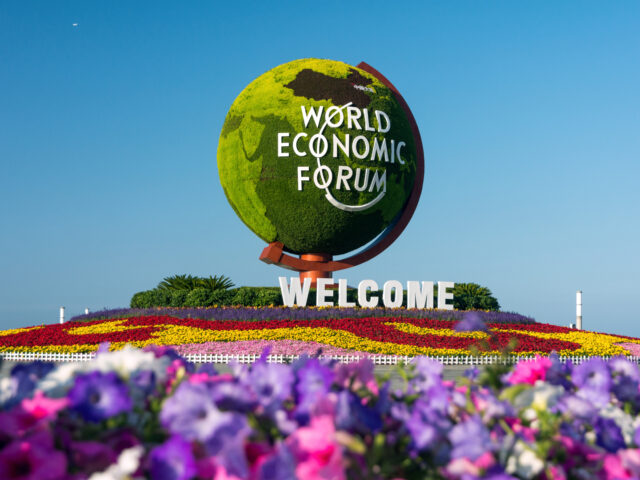A debate has emerged in Britain over the term ‘globalist’, with elements of the legacy media and social media arguing that using the word to describe the political ideology of preferring super state over state is actually a racist term against Jewish people.
Following what many, such as Brexit leader Nigel Fage, have described as a “globalist coup” to install former Goldman Sachs banker and World Economic Forum (WEF) acolyte Rishi Sunak as prime minister, left-wing figures have attempted to make the very term “globalist” an off-limits slur, claiming that it is antisemitic.
Last week, Nigel Farage tweeted: “Jeremy Hunt is now running the country. This is a globalist coup.” Mr Farage went on to make similar comments following the installation of Grant Shapps as Home Secretary.
The statements were condemned by Jewish groups, despite the fact that Mr Hunt is not Jewish but rather a member of the Church of England. Mr Shapps comes from a Jewish family.
Criticising the use of the term, Marie van der Zyl, the president of the Board of Deputies of British Jews, said: “Antisemitism experts such as the Anti Defamation League identify ‘globalist’ as a common antisemitic trope based on conspiracy theories about international Jewish power. Politicians should avoid using the term, particularly when referring specifically to Jewish individuals.”
The linguistic dispute came to a head on Sunday, when a caller to the LBC radio station echoed Mr Farage’s sentiments in describing Sunak as a “globalist” who “doesn’t seem to love England”.
For this remark, LBC host Sangita Myska, formerly of the BBC, chastised the caller, saying: “As we continue this conversation, please don’t use the phrase globalist again because many of my Jewish listeners will find that incredibly offensive because it has also been used, at times, as a racist put down to the Jewish community.”
“That’s not true,” the listener shot back. “If I meant Jewish, I’d say Jewish.”
Words being banned by mainstream media, this is not good. https://t.co/ZkAG8zhwl8
— Nigel Farage (@Nigel_Farage) October 24, 2022
Commenting on the exchange, Mr Farage, who was previously a host for LBC, lamented: “Words being banned by mainstream media, this is not good”.
Mr Farage also shared the Oxford English Dictionary’s definition of globalism, which states: “The belief that events in one country affect those in all other countries, and that economic and foreign policy should benefit the world as a whole instead of individual countries.”
Anglican deacon and GB News host Calvin Robinson also took aim at language policing from the media, writing on social media: “Be wary of anyone who hears ‘globalist’ and thinks ‘THE JEWS!’
“As ever, they are the very thing they accuse us of. A globalist is a politician who operates on an international perspective, rather than a local/national perspective. It’s only a slur in the mind of antisemitics.”
This is obviously bullshit.
The anti-globalisation movement and protests of the 1990s were categorically green and anti-capitalist.
Those movements found their peace (or price) with globalisation.
Now, nearly a third a century later, a historical smear is invented. https://t.co/HYxhxM7sQX
— Ben Pile (@clim8resistance) October 25, 2022
Political commentator and Spiked! columnist, Ben Pile noted that the origins of the anti-globalist movement were left-wing in nature, highlighting the protests against the World Trade Organization (WTO) such as the anti-capitalist ‘Battle of Seattle’ in 1999 in which black bloc anarchists rampaged through the American city, smashing businesses along their way. It has been estimated that Seattle businesses lost some $20 million in lost sales and property damage during the protests.
Pile went on to note that the BBC itself previously described the movement as thus: “The anti-globalisation movement is made up of a variety of causes, including environmentalism, debt forgiveness, animal rights, the protection of children, anarchism and anti-capitalism.
“Most of the movement’s adherents believe that globalisation leads to exploitation of the world’s poor, workers and the environment.”
Despite its left-wing origins, the term has since become a key phrase used by populists on the right, deployed by nationalist figures such as former President Donald Trump and Brexit leader Nigel Farage to differentiate themselves politically from corporatist and internationalist elements on both the left and right who are in favour of institutions such as the European Union and the World Economic Forum as opposed to those who favour a more localised focus for governments.
Coup Complete: Globalist Rishi Sunak Installed as Prime Minister of the United Kingdomhttps://t.co/b46Pf7AFyq
— Breitbart London (@BreitbartLondon) October 25, 2022
Follow Kurt Zindulka on Twitter here @KurtZindulka

COMMENTS
Please let us know if you're having issues with commenting.